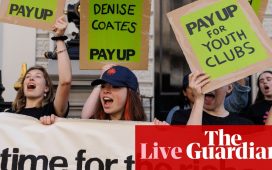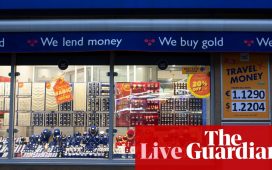Introduction: Mars to buy Hotel Chocolat in £534m deal
Good morning, and welcome to our rolling coverage of business, the financial markets and the world economy.
UK chocolatier Hotel Chocolat has agreed to be taken over by food giant Mars in a £534m deal.
The takeover, announced to the stock market this morning, will help Hotel Chocolat expand internationally, the companies say.
And Mars is paying a steep premium to get its prize. It will pay 375p per Hotel Chocolat share, a hefty 170% premium to last night’s closing price of 139p.
Mars, which employs around 10,000 people in the UK, says the deal will bring a “much-loved brand into its portfolio” and deepen its relationships with consumers.
It adds:
The UK has been an important market for Mars, and it expects this to be complemented by the acquisition of Hotel Chocolat, with its distinctive capabilities in product development, luxury gifting and immersive brand experiences.
Hotel Chocolat’s directors say the offer is fair and reasonable, and are recommending shareholders back it (the directors hold about 54% of the stock).

Angus Thirlwell, chief executive officer of Hotel Chocolat, argues that teaming up with Mars makes sense for his company.
Thirlwell says:
We know our brand resonates with consumers overseas, but operational supply chain challenges have held us back. By partnering with Mars, we can grow our international presence much more quickly using their skills, expertise and capabilities.
The pillars on which we have built the Hotel Chocolat brand – originality, authenticity and ethical trading, is precisely what brought Hotel Chocolat and Mars together and our intention is to strengthen and invest behind these. I’m excited about the future of the business and in Mars we have found an excellent long-term steward of the Hotel Chocolat brand and everything we stand for.”
The agenda
-
9.30am BST: Latest realtime economic data on UK economy
-
1.30pm BST: US weekly jobless figures
-
2.15pm BST: US industrial production stats for October
-
3.45pm BST: Bank of England deputy governor Dave Ramsden speaks at the 7th Annual Conference of the European Systemic Risk Board ‘Financial stability challenges ahead: emerging risks and regulation’
Key events
The fact Mars is willing to pay a 170% premium for Hotel Chocolat’s shares is remarkable on two accounts, says AJ Bell investment director Russ Mould:
First, bid premiums are typically in the 25% to 50% range so Mars paying so much more would suggest it has taken a long-term view of what the business is worth.
Second, it suggests that Mars has spotted an opportunity and there is no way it wants to waste time with a low-ball bid. This looks like going in with its best offer with the hope of wrapping up the transaction as quickly as possible.
“Mars doesn’t have to worry about sales of its eponymous chocolate bar, but it does have to think about the evolution of the business and tapping into parts of the market who are looking for a higher quality product.
Hotel Chocolat ticks the right boxes and while its international expansion strategy hasn’t gone to plan, perhaps Mars thinks it has the necessary skills to make a good job of turning the UK chocolatier into a global name. It is hard to imagine shareholders turning down such a generous offer.
Mr Kipling maker plans price cuts as cost inflation eases
Mr Kipling and Ambrosia maker Premier Foods has said it will start reducing prices across some of its products after seeing a drop in cost pressures.
Premier Foods told the City this morning that its imput cost inflation has slowed, meaning it can pass this onto consumers.
Alex Whitehouse, chief executive officer at Premier Foods, says:
“We know how challenging the past year has been for many consumers and so it’s good to see the rate of input cost inflation falling.
This has now given us the opportunity to lower promotional prices across a number of our major branded products such as Batchelors Super Noodles and Mr Kipling Slices.”
This means a cup of Super Noodles – a popular student snack – will cost less than a pound again, the Evening Standard says.
Food ingredients, and energy costs, surged after the invasion of Ukraine in March 2022. But global food prices have since fallen back to a two-year low.
Premier Foods has also reported a 17.7% increase in revenues in the first half of the financial year, to 30 September, with pre-tax profits up 38%.
Trading profits rose 19%, with profit margins in line with prior year, the company added.
Mars’s takeover of Hotel Chocolat is likely to add to concerns about an exodus from the London stock market, says Susannah Streeter, head of money and markets at Hargreaves Lansdown.
Streeter says:
The Mars owner clearly sees Hotel Chocolat as an appetising addition to its shelf of confectionery brands, providing an upmarket option to sit alongside Snickers, Twix, M&Ms and the ubiquitous Mars bar.
The price being paid is at a hefty premium to the share price at the close of trading yesterday but given the weakness of the pound would have helped fuel hunger for the acquisition. Hotel Chocolat has a loyal customer base of cocoa lovers, helped by its tasting club and its strategic locations across the travel network.
Although the company posted two profit warnings earlier this year, the recent update has been more encouraging, showing a turnaround bearing fruit, with stronger sales particularly at its new shops. International expansion however has proved super tricky for Hotel Chocolat, with its Japanese joint venture forced through insolvency.
The clout of the Mars operation, should help ensure Hotel Chocolat’s future ventures are far slicker, and the company clearly sees great opportunity for the brand’s expansion into other markets, particularly in the airport retail sector.’’
Although Hotel Chocolat’s shares are still up 160%, near to Mars’s offer, the wider stock market is more subdued.
Britain’s blue-chip FTSE 100 index is down 40 points, or 0.55%, at 7446 points, after three days of gains, while the FTSE 250 index of medium-sized companies is down 08.%.
Kyle Rodda, senior market analyst at Capital.com, says markets have been hit by US president Joe Biden calling Chinese president Xi Jinping a “dictator” at a press conference today.
Rodda explains:
Risk assets were already on the back foot in Asian trade. However, the comments gave the market an extra nudge in the bearish direction, as the tone of what had otherwise been a constructive visit to the US by the Chinese President soured. The White House hasn’t publicly retracted the comments or clarified yet. Whatever the outcome, it’s a stark reminder that geopolitical risks are never too far away from being a volatility driver in this market.
Futures are implying a soft open for the markets tonight, as Wall Street looks poised to take a breather following a ripping run through November. US jobless claims are released and expected to show a slight uptick in the number of Americans seeking unemployment benefits. At the same time, industrial production and the Philly Fed Manufacturing Index is tipped to decline.”
Mortgage lenders slashed more fixed rates to sub-5% this week
A string of UK lenders have cut their mortgage rates this week, as the financial markets have concluded that Bank of England interest rates are now at their peak.
Data provider Moneyfacts reports that Halifax, HSBC, Yorkshire Building Society, Virgin Money, Bank of Ireland UK and Bank of Ireland UK for Intermediaries have all revealed new sub-5% two-year fixed mortgages this week.
There are now 27 lenders offering a sub 5% fixed mortgage, Moneyfacts reports, up from 13 at the start of October.
At the start of November only Danske Bank was offering two-year fixed mortgages priced below 5%, with no lenders offering this at the start of October.
Rachel Springall, finance expert at Moneyfactscompare.co.uk, says:
“It’s encouraging to see cheaper mortgages on the market for borrowers, particularly the return of two-year fixed mortgages priced below 5%. This is great news for those who do not want to commit to a longer-term fixed deal. Several large lenders have slashed fixed mortgage rates and there is much anticipation for more cuts in the coming weeks.
As we head ever closer to the year-end, lenders will be weighing up both the current competition and their own lending targets, so it’s a promising market for consumers looking for a new deal.
Expect light trims before Christmas followed by a tentative cut next year, but restyling rates won’t kick in till there is inner confidence in taming inflation. Expectation; post election https://t.co/kEfpkRIs51
— Emma Fildes (@emmafildes) November 16, 2023
Hotel Chocolat’s swoon into the hands of chocolate giant Mars comes seven years after it floated on the London stock market.
That float, at 148p per share, valued the company at £167m, with founders Angus Thirlwell and Peter Harris recieving £20m each in 2016.
At the time, Thirlwell insisted that “Anyone who knows me knows that I am not really motivated by money”.
He and Harris each still own 27% of the company, so will pick up another £144m each through the sale to Mars.
Although Mars is paying a chunky premium of 170% to last night’s share price, today’s takeover offer is still below the peak of Hotel Chocolat’s value in 2021 (when shares hit 540p, valuing the firm at £740m).

EY picks Janet Truncale as the first woman to lead a Big Four firm

In the accountancy world, EY has become the first Big Four firm to appoint a woman as chief executive.
Janet Truncale, currently the head of EY’s financial services business in the Americas, will replace Carmine Di Sibio, who is retiring in June.
Partners were informed of the move yesterday in an email, in which Di Sibio said:
“Truncale is an exceptional leader, with a strong foundation in serving clients across all EY’s businesses.”
Truncale’s appointment comes just months after EY scrapped its planned breakup, which included a plan for the company to spin off its consulting business and much of its tax practice into a stand-alone public company.
The FT says Truncale beat early favourites including the British partner Andy Baldwin, who helped craft the spin-off plan, and Jad Shimaly, who runs EY’s business in Canada.
Megan Greene then warned that global investors have not fully grasped the message that central bank interest rates may have to stay at restrictive levels for some time.
BoE policymaker Greene told Bloomberg TV that there had been structural changes in major economies over recent years that pointed to a need for higher interest rates.
She says:
“I think markets globally haven’t really clocked onto this.”
Investors are expecting several cuts to UK interest rates next year, bringing them down to 4.5% by the end of 2024, down from 5.25% today.
Here’s another clip from Megan Greene’s interview this morning:
BoE’s Greene: Too early to think about interest rate cuts
Bank of England policymaker Megan Greene has hailed yesterday’s fall in inflation to 4.8% as ‘good news’, but warned that it’s too early to consider cutting interest rates.
Speaking on Bloomberg TV, Greene – a member of the Monetary Policy Committee – said that UK wage growth was still “incredibly high”, and that there are reasons to worry about the persistence of inflation in the UK.
She says:
The recent data is good news.
Inflation came down pretty significantly, in both headline and core, but the biggest contributor was energy.
Greene is one of three MPC members who wanted to raise UK interest rates to 5.5% last month, but were outvoted by the other three committee members.
She says the Bank’s current monetary stance is restrictive, but the question is whether it is restrictive enough to bring inflation down to the 2% target.
She says she is not thinking about cutting interest rates at the moment, adding “I don’t think that’s where we are.”
The money market, through, are anticipating a rate cut, down to 5%, by next May.
Yesterday, the UK’s inflation rate fell from 6.7% to 4.8%, more than half its peak last autumn. Wages are rising faster, with total pay up 7.9%.
Greene argues that bringing inflation down from 10% to 5% is easier than the journey from 5% to 2%.
October’s inflation data included the drop in energy prices last month, after Ofgem lowered the price cap. That means energy disinflation has now largely come through in the data, so the Bank of England will be relying on goods and services inflation slowing, she explains.
Ofgem launches review of standing charges
In the energy sector, regulator Ofgem has launched a review into the ‘standing charges’ levied on customers by suppliers.
Standing charges cover cost such as maintaining the energy supply network and taking meter readings, and also support help schemes for people that cannot afford energy, and environmental schemes.
But they are controversial, as customers pay them regardless of how much, or little, energy they use.
Peter Smith of fuel poverty charity National Energy Action (NEA), says the system needs overhauling.
‘For years, there has been growing alarm about increases to standing charges. Many people rightly feel they are now too high and the current approach is unfair.
How can it be right that someone who can’t afford any energy for their home, still pays a daily charge that is the same or more than someone in a mansion? An overhaul of the system is long overdue.’
Rail strikes: Aslef announces industrial action in December

Gwyn Topham
The train drivers’ union, Aslef, will stage a series of one-day strikes and call an overtime ban across England’s operating companies at the start of December, ratcheting up the national rail dispute again.
Drivers at each company will strike for 24 hours on dates between Saturday 2 and Friday 8 December, and will refuse to work overtime between Friday 1 and Saturday 9 December, causing more disruption for operators that rely on rest day working.
The move comes days after the RMT union and employers signalled a possible breakthrough, with an agreement on pay to be ratified in a members’ vote.
The fresh strikes appear to have been partly provoked by remarks made by the transport secretary, Mark Harper, at a select committee hearing on Wednesday, which the union described as “disingenuous”. Harper said Aslef should put an offer rejected as “risible” by the union in April to drivers. The union said the offer was no longer on the table and had in effect been rejected in further votes for strikes.
More here.
Analyst: the shine is dimming on the luxury sector
Burberry’s warning that it could miss its revenue target shows that “the shine is dimming on the luxury sector as even higher end consumers tighten their belts”.
So explains Sophie Lund-Yates, lead equity analyst at Hargreaves Lansdown, who adds:
Heralded as a more resilient corner of the economy, suggestions of missing targets and lower-end profits aren’t what investors have come to expect and that has consequences for valuations. Specifically for Burberry, it doesn’t have a basket of other brands or products to help diversify risk in this scenario.
The work the group’s done to become a more premium luxury house is to be commended and will improve strength in the long-term, but there’s no getting away from the fact that particularly aspirational, younger shoppers are thinking twice before swiping their cards. There could be further pressure to come before things improve, especially if a broader pull back in spending comes through in 2024 after the glut of festive trading.
The UK’s decision to halt VAT refunds is denting demand in the important UK market, Lund-Yates adds:
The scheme was an important pull to encourage tourist spending and this revenue-cow now has no more to give. The wider European region is seeing an increase in tourist spending overall which is the shift Burberry wanted to see – American and Asian tourists splashing the cash while taking in Europe’s sights is a cornerstone of the business model.
Burberry has done pretty much all it can to place itself in a better position, both operationally and creatively. The issue is that while it’s a slicker and bolder beast, Burberry is currently residing in a hostile environment outside of its control.”
The huge, 170%, premium which Mars is prepared to pay for Hotel Chocolat suggests the stock market had rather undervalued the business.
Retail analyst Nick Bubb says Mars’s move is a ‘shock takeover’, explaining:
Well, Hotel Chocolat has had its problems recently, not least with its Overseas expansion, but even so the disconnect between financial market valuations and takeover valuations shows through in the huge premium that Mars has been willing to pay for the business…
Hotel Chocolat shares surge 164% towards takeover offer
Boom! Hotel Chocolat’s shares have surged by 164% this morning.
They’ve jumped from 139p to 369p in early trading, to just below Mars’s offer of 375p in cash.
Ouch. Shares in Burberry have tumbled almost 10% in early trading, to the bottom of the FTSE 100 leaderboard.
Burberry hit by slowdown in luxury spending

Another UK brand, Burberry, has been hit by a slowdown in luxury spending.
Burberry told shareholders this morning that “the slowdown in luxury demand globally” is having an impact on current trading.
If the weaker demand continues, Burberry says it is unlikely to achieve its revenue guidance for the 2024 financial year, and operating profits would only come in towards the lower end of the current consensus range (£552m-£668m).
Jonathan Akeroyd, Burberry’s chief executive officer, says:
We made good progress against our strategic goals, executing our priorities at pace. We continued to build momentum around our new creative vision with the launch of our Winter 23 collection in September, the first designed by Daniel Lee.
While the macroeconomic environment has become more challenging recently, we are confident in our strategy to realise our potential as the modern British luxury brand, and we remain committed to achieving our medium and long-term targets.”
Burberry has reported a 4% rise in revenues in the six months to the end of September (the first half of its financial year) but a 15% drop in operating profits.
It says sales in mainland China increased 15% in the half, but fell 8% in the second quarter (July-September) “as spending shifted offshore”.
Sales in the Americas fell by 9% in the half – a sign that US consumers may be cutting back.
Burberry says:
While the American customer has remained weak overall, we are pleased with the progress made with our customer acquisition programme with an increased share of higher income female clients.
Introduction: Mars to buy Hotel Chocolat in £534m deal
Good morning, and welcome to our rolling coverage of business, the financial markets and the world economy.
UK chocolatier Hotel Chocolat has agreed to be taken over by food giant Mars in a £534m deal.
The takeover, announced to the stock market this morning, will help Hotel Chocolat expand internationally, the companies say.
And Mars is paying a steep premium to get its prize. It will pay 375p per Hotel Chocolat share, a hefty 170% premium to last night’s closing price of 139p.
Mars, which employs around 10,000 people in the UK, says the deal will bring a “much-loved brand into its portfolio” and deepen its relationships with consumers.
It adds:
The UK has been an important market for Mars, and it expects this to be complemented by the acquisition of Hotel Chocolat, with its distinctive capabilities in product development, luxury gifting and immersive brand experiences.
Hotel Chocolat’s directors say the offer is fair and reasonable, and are recommending shareholders back it (the directors hold about 54% of the stock).

Angus Thirlwell, chief executive officer of Hotel Chocolat, argues that teaming up with Mars makes sense for his company.
Thirlwell says:
We know our brand resonates with consumers overseas, but operational supply chain challenges have held us back. By partnering with Mars, we can grow our international presence much more quickly using their skills, expertise and capabilities.
The pillars on which we have built the Hotel Chocolat brand – originality, authenticity and ethical trading, is precisely what brought Hotel Chocolat and Mars together and our intention is to strengthen and invest behind these. I’m excited about the future of the business and in Mars we have found an excellent long-term steward of the Hotel Chocolat brand and everything we stand for.”
The agenda
-
9.30am BST: Latest realtime economic data on UK economy
-
1.30pm BST: US weekly jobless figures
-
2.15pm BST: US industrial production stats for October
-
3.45pm BST: Bank of England deputy governor Dave Ramsden speaks at the 7th Annual Conference of the European Systemic Risk Board ‘Financial stability challenges ahead: emerging risks and regulation’







